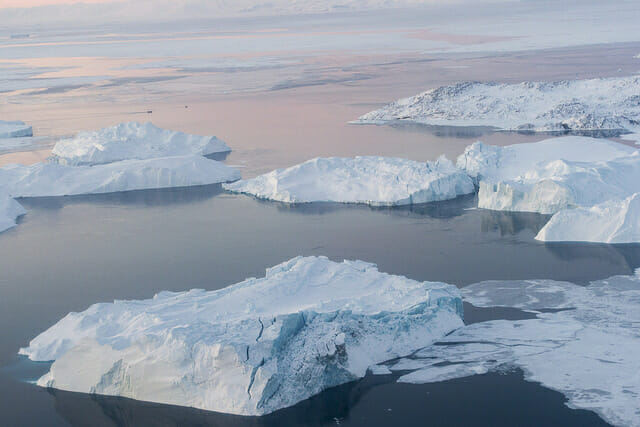Earth Could Be Less Than 2 Degrees From Catastrophe, New Study Finds
Scientists fear rising temperatures could trigger a domino effect that leads to civilizational collapse. United Nations Photo / Flickr
United Nations Photo / Flickr
Warning of a possible domino effect as multiple climate feedback loops are triggered within a dynamic cascade of rising temperatures and warming oceans, scientists behind a frightening new study say that for the sake of humanity’s future they hope scenarios explored in their new models do not come to pass.
“I do hope we are wrong, but as scientists we have a responsibility to explore whether this is real,” Johan Rockström, executive director of the Stockholm Resilience Centre, where the research was done, told the Guardian. “We need to know now. It’s so urgent. This is one of the most existential questions in science.”
Published in the Proceedings of the National Academy of Sciences, the new study, while not conclusive in its findings, warns that humanity may be just 1°C [1.8 F] away from creating a series of dynamic feedback loops that could push the world into a climate scenario not seen since the dawn of the Helocene Period, nearly 12,000 years ago.
The research, according to its abstract, explores “the risk that self-reinforcing feedbacks could push the Earth System toward a planetary threshold that, if crossed, could prevent stabilization of the climate at intermediate temperature rises and cause continued warming on a ‘Hothouse Earth’ pathway even as human emissions are reduced. Crossing the threshold would lead to a much higher global average temperature than any interglacial in the past 1.2 million years and to sea levels significantly higher than at any time in the Holocene.”
As Rockström explains, the “tipping elements” examined in the research “can potentially act like a row of dominoes. Once one is pushed over, it pushes Earth towards another.” And in an interview with the BBC, he added, “What we are saying is that when we reach 2 degrees of warming, we may be at a point where we hand over the control mechanism to Planet Earth herself. We are the ones in control right now, but once we go past 2 degrees, we see that the Earth system tips over from being a friend to a foe. We totally hand over our fate to an Earth system that starts rolling out of equilibrium.”

Such feedback occurences, the authors of the study write, would pose “severe risks for health, economies, political stability, and ultimately, the habitability of the planet for humans.”
With Arctic ice and glaciers melting away; increasingly powerful and frequent storms in the Atlantic and Pacific; coral reefs dying from warming oceans; record-setting wildfires in the U.S.; unprecedented heatwaves in Europe, the Middle East, and elsewhere—climate researchers have been at the forefront of sounding the alarms about the frightening path humanity is now following.
“In the context of the summer of 2018, this is definitely not a case of crying wolf, raising a false alarm: the wolves are now in sight,” said Dr. Phil Williamson, a climate researcher at the University of East Anglia, about the latest study. “The authors argue that we need to be much more proactive in that regard, not just ending greenhouse gas emissions as rapidly as possible, but also building resilience in the context of complex Earth system processes that we might not fully understand until it is too late.”
This is, by far, the biggest political issue in the world. It is the one thing that will affect everyone on the planet for centuries to come. Why isn’t everyone shouting it from the rooftops? https://t.co/HwP4sMMmoA
— Nick_Swindon (@nick_swindon) August 6, 2018
In order to avoid the worst-case scenarios, the researchers behind the study say that “collective human action is required” to steer planet’s systems away from dangerous tipping points. “Such action,” they write, “entails stewardship of the entire Earth System—biosphere, climate, and societies—and could include decarbonization of the global economy, enhancement of biosphere carbon sinks, behavioral changes, technological innovations, new governance arrangements, and transformed social values.”
Your support matters…Independent journalism is under threat and overshadowed by heavily funded mainstream media.
You can help level the playing field. Become a member.
Your tax-deductible contribution keeps us digging beneath the headlines to give you thought-provoking, investigative reporting and analysis that unearths what's really happening- without compromise.
Give today to support our courageous, independent journalists.






You need to be a supporter to comment.
There are currently no responses to this article.
Be the first to respond.